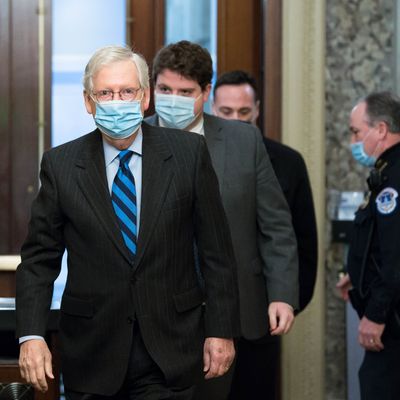
The Senate overwhelmingly voted to override President Trump’s veto of the annual defense spending bill on Friday — marking the first time Congress has overridden a Trump veto, less than three weeks before his presidency is due to end. The 81-13 vote was well over the two-thirds majority needed, as was the earlier 322-87 vote in the House to override the veto on Monday.
Friday’s Senate vote was also almost certainly the last vote of the 116th Congress, which ends on January 3. The Senate later adjourned — meaning there is now officially no chance that this week’s attempt to increase the latest round of COVID stimulus checks to $2,000 will succeed following Senate Majority Leader Mitch McConnell’s block of that bipartisan effort.
President Trump vetoed the bipartisan $741 billion National Defense Authorization Act last week after repeatedly threatening to do so, primarily in objection to a provision included in the legislation to rename the U.S. military bases and installations that are named after Confederate figures. Trump later insisted that the military spending bill also include a repeal of Section 230, the law that shields tech companies from liability over what’s posted on their websites. That’s what Trump focused in a tweet on Friday after his veto was overridden in which he attempted to shame “pathetic” Senate Republicans for failing to repeal the law.
GOP senators David Perdue and Kelly Loeffler — who have conspicuously avoided taking a position on the veto override ahead of their runoff elections in Georgia next Tuesday — were not present for Friday’s vote. Loeffler remained in Georgia to campaign, while Perdue was quarantining with his wife in the state after they had been in close contact with someone infected with COVID-19.
There was also a last-ditch attempt to revive the $2,000 COVID stimulus payments to Americans in the Senate on Friday, but as NBC News reports, it failed:
[Senate Minority Leader Chuck Schumer] attempted to pass the House bill raising the stimulus payments by unanimous consent on Friday, but Sen. John Thune, R-S.D., objected. Sanders and Hawley tried again later in the day, offering to also vote on an alternate version offered by McConnell that combined the $2,000 checks with Section 230 reform and legislation to review the 2020 election, but that was blocked as well.
Trump, who’d repeatedly called for increasing the payments to $2,000, had been largely silent at the issue as Democrats and Hawley tried to get the measure passed this week. Shortly after Thune objected, Trump tweeted that Republican South Dakota Gov. Kristi Noem should run against Thune in a primary.
The next drama due up in the Senate will be on Wednesday, when Congress will vote to certify President-elect Joe Biden’s Electoral College victory, which it is expected to do despite a desperate attempt by Trump and his GOP loyalists to prevent that. Mitch McConnell, who does not support Trump’s effort, reportedly told Senate Republicans on Friday morning that the vote on the Electoral College results on January 6 “will be the most consequential I have ever cast.”






























